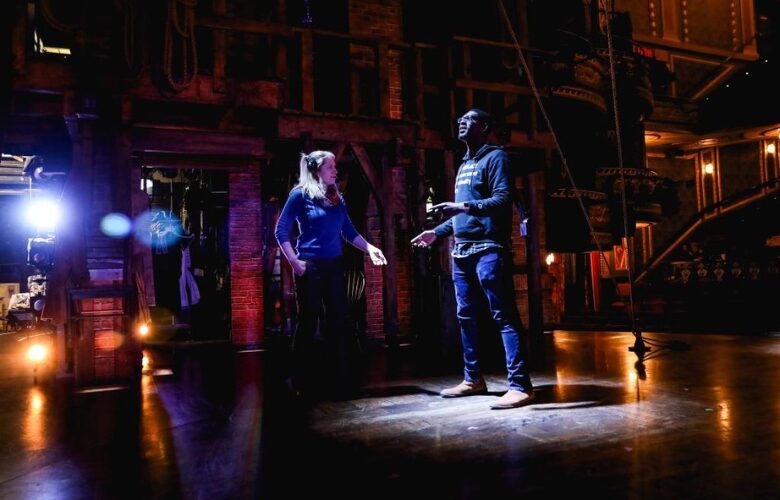
Whether you’ve been in the business for years or you’re just starting out, we can all benefit from looking at the places where conflicts may arise between stage management and performers. Generally, the relationship between the two is one of mutual support and respect. The stage manager acts as advocate, overseer and support for the performer and the show, and the talent in turn performs their part professionally, artistically, and in accordance with the direction. For the most part, this is a balanced, beneficial union – especially as people grow in their careers and experience. But what about when conflicts arise?
“Is it impossible for the talent to be on time?”
“Did the stage manager not pay any attention to when I was available? My call times for rehearsals are all when I’m working.”
“Why can’t the actors get [these things] back where they belong?”
“Can’t the stage manager see that we can’t rehearse without [this tech cue] working right?”
Discord between stage management and talent can cause stress and negatively impact live performances. What are the areas that cause tension during live events? Let’s take a deeper look at where conflict can arise, how communication breakdowns happen, why they occur and what each can do to rebuild the trust.
When you started in the business you might have had numerous resources on how to get a job/role, how to act, how to call a show – but how did you learn what to do once you got the job? Or how to build a reputation as a trusted professional? If you were lucky, you had a great mentor to show you the ropes. If you weren’t so lucky, you may have had to learn the hard way – by making mistakes.
Both performer and stage manager have roles to carry out and most times these are straight forward and understandable. There are many components to the stage manager’s job but in a nutshell, they are in charge of the show, the lynch pin between technical and artistic threads. This role needs to be handled in a fair, direct and patient manner. It is crucial that the stage management team understand that the performers carry a lot of responsibility as the public face of the show, along with their own artistic integrity.
The performer’s role is a bit more esoteric but the artistic aspect should not overshadow the needs of the production. What does it mean for a performer to show up as a ‘professional’? Performers need to know their lines/act/role, show up on time, and not be a distraction to the event. Yes, acting is an artistic venture, but if the other performers and the stage management team don’t see you as a professional team player, you’re looking at an uphill battle and conflict with not just stage management, but the whole crew. It’s important for a performer to remember that stage management is responsible for the entirety of the show. A performer is a piece of this puzzle but the stage manager is responsible for keeping all the balls in the air as well as dealing with issues that arise. It’s hard! Don’t be the stressor that makes it harder.
And you both want to be hired again! The last thing you want is for anyone on the production to say, “Really talented, but what a pain in the ass to work with.” or conversely, “Well, they were super organized, but they just pissed off all the performers.” You start to realize when you are working, what a small world it truly is. Your own “Six Degrees of Separation” can come back to bite you.
Let’s say that all are committed to the production, don’t want to leave and the show is safe, if not completely finished. But if the budget doesn’t allow for final touches to the set, costumes, prop person, Assistant Stage Manager, etc.– it can put both sides on edge and lead to frustration and venting. Stage managers can do everything in their power to overcome production deficits, but it’s important to remember that the face of these sub-par outcomes usually lands at the performer’s feet as they are who the audience sees. It’s similar to a job waiting tables. If the food is bad, it’s the waitperson who bears the brunt of the dissatisfied customer. Even if that customer says, “I know it’s not your fault…” you are still the one who deals with their ire. It’s important to remember that frustration can rise up and everyone may let off steam at times, but don’t direct your anger at each other.
Shows have so many moving parts that there will always be challenges – from malfunctioning equipment, to missed cues (technical and performer!), to missing props and a host of others. It takes savvy performers and stage managers to stay lively during events so they can support and cover for each other. It may be the stage manager taking the lights down because a performer fell or an actor commenting on the broken light switch because the lighting cue didn’t go. Again, the actor is the face of whatever the mishap and often times it is due to their covering of the incident and fast acting by stage management, that the audience is not even aware anything went awry. Be appreciative of each other when these snafus take place. This teamwork is paramount in live events and it’s this mutual care of each other that makes the production seamless.
When performer and audience work in close contact with each other, a host of challenges can arise, from annoying to dangerous, and good performer-stage manager partnerships are key to safe outcomes. The stage manager needs to know that the performer will work with them to address any issues, and the performer needs to know management is putting their safety first. If that relationship isn’t cared for, tensions can arise that will inhibit the ability for the team to address issues that pop up.
If you have ever worked in live experience or theme parks you know that this is where the performer and stage manager need to be ready for anything. A performer is working the crowd, the audience is having a great time, and suddenly a guest drops to the floor with heat exhaustion. The performer and stage managers work in tandem to aid the guest, get the situation under control, get the show back on track and re-immerse the audience into the world of the show. Both have their roles to play.
Audience members under the influence of alcohol and drugs drastically affect a performer. Sometimes it’s a small disturbance, the performer can even use it to their advantage with the audience, but it can also quickly get out of hand and become uncomfortable for everyone at best, and dangerous at worst.
Stage management should work with the performers to put safety measures in place before these situations break out. They should get performer input on how to handle these issues and drill down on protocols and outcomes. The performers are on the front lines dealing with the mayhem and can bring potential incidents to light. They often can sense when things may go awry and having a Standard Operating Procedure for unruly guests, sick audience members, reoccurring technical issues, etc. can put everyone a bit less on edge. Stage management may not be able to provide all the protections performers would like, but the performer should feel safe in the environment. It’s important to remember that each are responsible for certain aspects of the show, and if there is trust on both sides it expedites this challenging process.
There can sometimes develop an ‘us vs them’ attitude in a production – and that discord can negatively influence the live performance. The management/technical side may feel the performers seem entitled, lazy, or a prima donnas. Performers may think management doesn’t understand their process, are dismissive of their contribution or don’t think what they do is so tough. This can lead to both sides feeling unsupported and irritated. If you haven’t ever had the chance to change positions in the performance world, it’s a great thing to do. Most academic programs have majors take at least a class in different aspects of theatrical production, which is a great start. Seeing all the areas a stage manager has to be aware of and the fast thinking that accompanies dealing with challenges that come up can be an eye opener. Alternately, taking a deep dive into the building of a character/performance and stepping out in front of an audience can help one feel the weight of the artistic work, bringing a character to life and holding the audience’s attention. Mutual respect can grow out of being in another’s shoes, or at least seeing and imagining what that might be like. And new performers should take note that often the first productions you will be a part of, or performing groups you may join, will carry with them the “everybody does everything” mantra. You may have played the title role of Othello in your MFA program but now you’re scouring thrift stores for a three-legged stool for an original piece written by your roommate in a 25 seat box where you play a waiter, tap dancer, monk and run lights. And the same is true for stage management. Your first jobs involve producing, building a floating solar system set, running concessions at intermission and a quick walk on in Act II.
Challenges will arise – the way you respond sets the tone of the ensemble. Let’s walk through an example where good communication builds rapport, and bad communication can destroy cohesion – note giving. Love it or hate it (and no one loves it) – it has to happen.
The stage manager is in charge of holding the show true to the director’s vision and that means giving performers notes throughout the run. There are technical notes, which are usually handled pretty quickly and easily. For example, the performer is crossing a line sooner than they were blocked and it is throwing off a lighting cue. Others are a bit stickier – like an actor changing their performance. Stage managers need to think about why a performer might change their performance and give their notes with that in mind. Usually changes like this have to do with keeping the role fresh, so a performer feels like they’re doing it for the first time with each night’s audience. It’s hard! Doing the same show over and over can easily become rote and dull – and no one wants that, not the performer, not management – and definitely not the audience. Actors are always playing with their performance to keep it alive. While striving to do this, performers may step over the original direction and then the stage manager needs to give notes on how they can come back in line with the overall focus of the show.
So maybe the stage manager notices something about timing or intention or playing a moment too much for the laugh. (Please note: audience laughter is like a drug to performers. If we are getting it, we want more…and more, not always to the benefit of the show’s arc.) The stage manager needs to address the performer in a way as to not put them on the defensive, focus on the fact that this note is to keep the show in line with the director’s vision, and leave with the understanding that the performer will return to the original intent. Timing and preparation are everything here. It helps to set a time for notes: give notes on Tuesdays, or directly after a performance tell performers that you will be coming around to give notes before the next night’s performance. Make sure the timing is good for the performer. Perhaps they have a very specific pre-show ritual or at the end of the night, they just need to shake off the show and go home. Finding a mutually beneficial time can work wonders for readying the person receiving the notes. And know that what you see as a pretty straightforward note, is very personal to the performer. They are the medium in this art form. It is their body, voice, characteristics. When you address their performance, you are addressing their personal character. Tread carefully and with kindness. And please don’t assume a “general note” to the company will be taken to heart by the person you think needs to hear it most. Many a performer may think the note you are giving is spot on… but surely doesn’t apply to them.
As a performer, know that notes are a given. You will be getting them and you will not always (read: never) like them. Trust the director, trust stage management. Find your creativity and freshness in ways that keep the continuity and vision of the director. If you have something you would like to try that may be a bit new, run it by stage management first, and if you get the go-ahead, be sure to clue in your scene partner(s) in advance. Being professional and building trust with management and the ensemble from the beginning of the theatrical process allows for more latitude and confidence during a run. Performers know that while a forgotten line or a missed cue is anxiety producing, it also makes for a spark onstage and hyper focus of all involved in that moment. The tough part is to find those sparks without changing your performance intent… and without a pivotal glitch in the moment.
And finally, but most importantly, be appreciative. Say thank you at the end of the night, acknowledge when someone has gone above and beyond, or has to consistently deal with the same technical problem, or helped you out of a tight spot, made an accommodation for you, etc. This is especially true for the management side, they may get the occasional hand acknowledgement during bows, but their work is largely behind the scenes and though they may not want the spotlight, they still would like to be recognized for their contribution.
The stage management/performer relationship is the foundation of a successful production and that begins with mutual respect for one another’s work. When supported by professionalism, trust and solid communication this collaboration elevates the production and creates a safe, satisfying and artistically advantageous environment for all involved.
Comments: We would love to hear your responses. Please post in the comments below and share with us your own experiences both challenging and successful related to the stage management/performer relationship.
Thanks for reading!

Jane McPherson has been in the entertainment industry for many years. She has worked mostly as a performer, but also in management and technical positions. Throughout her career she has worked in theatre, commercials, television and film, voice-overs, interactive media and immersive events, theme parks and a host of other artistic adventures both successful and… instructional.
Also by Bryan Runion:


Bryan Runion is a professional Production Stage Manager whose credits include: Drawn to Life (Cirque du Soleil and Disney), Netflix’s Stranger Things: The Experience, Duel Reality (7 Fingers), La Perle (Dragone), The Voice of Tolerance (The Ministry of Education, UAE); Mastercard Experiences (Mastercard); Everybody Black (World Premiere), Queens (La Jolla Playhouse), Ken Ludwig’s The Gods of Comedy (The Old Globe), TEDx (Chula Vista), Mark Morris Dance Company, Joey Alexander Trio, Ukulele Orchestra of Great Britain (La Jolla Music Society), The Bridges of Madison County (Arkansas Rep). Bryan earn his M.F.A. at The University of California, San Diego and his B.A. at The University of Arkansas at Little Rock. He is a proud member of Actors’ Equity Association and The Stage Managers’ Association.
Read Full Profile© 2021 TheatreArtLife. All rights reserved.

Thank you so much for reading, but you have now reached your free article limit for this month.
Our contributors are currently writing more articles for you to enjoy.
To keep reading, all you have to do is become a subscriber and then you can read unlimited articles anytime.
Your investment will help us continue to ignite connections across the globe in live entertainment and build this community for industry professionals.